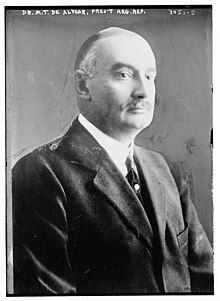This article needs additional citations for verification. (October 2021) |
Marcelo Torcuato de Alvear | |
|---|---|
 | |
| 20th President of Argentina | |
| In office 12 October 1922 – 12 October 1928 | |
| Vice President | Elpidio González |
| Preceded by | Hipólito Yrigoyen |
| Succeeded by | Hipólito Yrigoyen |
| President of the Radical Civic Union National Committee | |
| In office December 1931 – 23 March 1942 | |
| Preceded by | José María Martinez |
| Succeeded by | Gabriel Oddone |
| Personal details | |
| Born | Máximo Marcelo Torcuato de Alvear Pacheco 4 October 1868 Buenos Aires, Argentina |
| Died | 23 March 1942 (aged 73) Don Torcuato, Buenos Aires, Argentina |
| Resting place | La Recoleta Cemetery Buenos Aires, Argentina |
| Political party | Radical Civic Union |
| Spouse | Regina Pacini |
| Alma mater | University of Buenos Aires |
| Profession | Lawyer |
| Signature |  |
| Military service | |
| Allegiance | |
| Branch/service | |
| Rank | Lieutenant colonel |
Máximo Marcelo Torcuato de Alvear Pacheco (4 October 1868 – 23 March 1942), was an Argentine lawyer and politician, who served as president of Argentina between from 1922 to 1928.
His period of government coincided precisely with the end of the postwar world crisis, which allowed him to improve the economy and finances of the country without major setbacks. He also stood out in the development of the automotive industry and the successful oil exploitation, with which he achieved an economic prosperity unknown until then for Argentina, and that was demonstrated with the great increase achieved in the GDP per inhabitant, whose index for the In 1928 he had reached the sixth position among the highest in the world. In the labor and social sphere, this period was characterized by a process of urban concentration in the Litoral and Greater Buenos Aires, in addition to the establishment of half a million immigrants; there was an increase in the middle class, a rise in real wages, and a decrease in strikes and similar conflicts.[1]
When he left the presidency he settled in France. He returned to the country a few years later to reunify his party and try to become president for the second time in 1931, but his candidacy was prohibited by the military regime of José Félix Uriburu. Alvear, along with other radical coreligionists, was persecuted, imprisoned or had to go into exile on repeated occasions by the repressive regime of the infamous decade, for which he experienced the Martín García prison on the island.
On 23 March 1942 struck down by a heart attack, Marcelo Torcuato de Alvear died next to his wife Regina Pacini at their home in Don Torcuato.